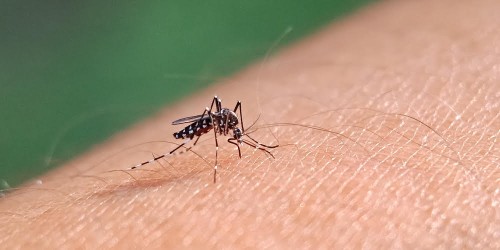KINGSTON, Jamaica – Health authorities are urging Jamaicans to continue taking measures to prevent the spread of dengue after the country recorded 1,534 confirmed cases of the mosquito borne disease as of January 11, this year.
 The Ministry of Health and Wellness said at the same time, there have been a total of 19 dengue-related deaths, 13 classified as suspected and six as confirmed.
The Ministry of Health and Wellness said at the same time, there have been a total of 19 dengue-related deaths, 13 classified as suspected and six as confirmed.
It is also urging the public not to use aspirin, diclofenac, ibuprofen, or any of the medications and pain relievers known as non-steroidal anti-inflammatory drugs (NSAIDs).
It said that these drugs, when used to treat the fever in dengue, have been known to increase the severity of the disease.
The ministry said that Jamaica had on record 1,534 confirmed dengue cases as of January 11 and that while dengue serotypes 2, 3 and 4 have been identified among the population, dengue serotype 2 remains the dominant strain.
The health authorities said St. Thomas continues to be the parish with the highest rate of 696.1 cases per 100,000 population, followed by Trelawny (551.7) and Hanover with 497.5 per 100,000.
The highest number of dengue cases continues to be observed in the five to 14-year-old cohort at a rate of 885.3 cases per 100,000 population.
Meanwhile, the Medical Officer of Health for St. Ann, Dr. Tamara Henry, says there has been no recorded case of dengue in the garden parish since last December.
Addressing the monthly sitting of the St. Ann Municipal Corporation, Dr. Henry noted that as of January 10, 2023, there were 407 suspected cases of dengue, with 13 presumed and 78 confirmed.
“We want to say congrats to the populace, because they are doing what they are supposed to be doing and we are happy about that. We had our peak in October, but subsequently they kept trending down and I’m very happy about that,” Dr. Henry said.
“We continue with our search-and-destroy activities. In the month of December, we visited over 7,000 premises and 105 of those were key premises. We were able to inspect 15,765 containers, 2,348 of those were positive, giving us a container index of 14.5 per cent and we are happy about that, because in the month of November, we were at 19.71 per cent,” she added.
Dr. Henry said that 58 fogging sessions were done across the parish, noting that the activity was hindered by the weather conditions and that they will continue with the effort.
She warned that there is no room for complacency and that dengue remains a clear and present danger and that everyone is at risk, noting “we are seeing elevated indices in some areas”.
Dengue viruses are spread to people through the bite of an infected Aedes aegypti or Aedes albopictus mosquito. Dengue is often a leading cause of illness in areas with risk. The most common symptom of dengue is fever with any of the following, nausea, vomiting, rash, aches and pains including eye pain, typically behind the eyes, muscle, joint, or bone pain.


